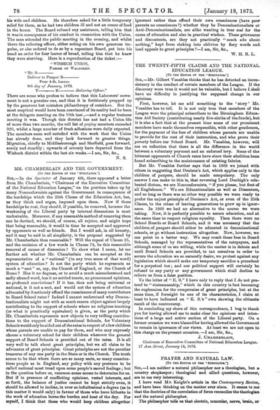THE TWENTY-FIFTH CLAUSE AN]) THE NATIONAL EDUCATION LEAGUE.
[TO THE EDITOR OF THE " SPECITATORr]
Sin,—Mr. Gilbert Venables thinks that he has detected an incon- sistency in the conduct of certain members of the League. If the- discovery were true it would not be valuable, but I believe I shall have no difficulty in justifying the supposed change in our opinions.
First, however, let me add something to the 'story' Mr. Variables has to tell. It is not only true that members of the League were the principal subscribers to the Birmingham Educa- tion Aid Society (contributing nearly five-sixths of the funds), but it is also a fact that at the present time some of our prominent members have made themselves responsible, with other gentlemen, for the payment of the fees of children whose parents are unable to provide for the cost of their instruction, and who prove their poverty before our School Board. Mr. Venable& however, will see on reflection that there is all the difference in the world between a voluntary payment and an enforced levy. Some of the bitterest opponents of Church rates have since their abolition been found subscribing to the maintenance of existing fabrics.
But Mr. Venables further says that in 1868 we joined with others in suggesting that Denison's Act, which applies only to the children of paupers, should be made compulsory. The only, answer I can make to this is, that reversing Lord Denbigh's cele- brated dictum, we are Nonconformists, "if you please, but first of all Englishmen." We are Educationalists as well as Dissenters, and so long as there was no other way possible we were ready to prefer the unjust principle of Denison's Act, or even of the 25th Clause, to the crime of leaving generations to grow up in ignor- ance. In 1868 we had no alternative to the course ire were taking. Now, it is perfectly possible to secure education, and at the same time to respect religious equality. Then there were no- School Boards or Board Schools, and it was necessary that the children of paupers should either be educated in denominational schools, or go without instruction altogether. Now, however, we- can point to a better way. We may remit these fees in Board Schools, managed by the representatives of the ratepayers, and although some of us are willing, while the matter is in debate and until Board Schools are provided, to tax ourselves in order to secure the education we so earnestly desire, we protest against any legislation which should make our temporary sacrifice a precedent for a perpetual tax ; and our political support will certainly be refused to any party or any government which shall decline to relieve us from a false position.
To the letter of "B. S." I have only to reply that I do not pre- tend to "statesmanship," which in this country is fast becoming- the euphemism for the compromise of great principles, but at the- same time, if foresight be one of its characteristics, I claim at least to have indicated on "B. S.'s " own showing the ultimate- result of the controversy.
In concluding my share of this correspondence, I beg to thank you for having allowed me to make clear the opinions and inten- tions of a large and active section of the Liberal party. On a former occasion we were blamed for having allowed the Government to remain in ignorance of our views. At least we are not open to- this charge on the present occasion. —I am, Sir, &c., J CEAKBEILLAIN,
Chairman of Executive Committee of National Education League.. 17 Ann Street, January 14, 1878,


































 Previous page
Previous page